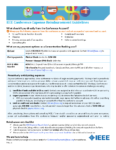Tracking Your Transactions
Bookkeeping and holding a record of all transactions is an important component of managing conference finances. This will allow you to keep updated forecasts, understand how the actual financial numbers have evolved from the budget throughout the conference lifecycle, and easily create a final financial report.
Jump to a Topic:
Tracking Your Transactions
The following short video will summarize the importance of forecasting, how to maintain and utilize Actuals to Date, and the proper format to construct a transaction detail report.
The Importance of Forecasting
A forecast is a variation of the budget after new information has come to light and altered the original numbers projected for conference revenue and/or expenses. The best way to maintain a forecast is to keep it alongside your budget. Your budget numbers will always stay the same, while your forecast numbers change, allowing you to easily track how the financials for your event are evolving. IEEE CEE should be notified of any significant changes from budget to forecast. As a best practice, organizers are advised to submit a pre-conference and post-conference forecast to IEEE CEE.
Conference Expense Reimbursement Guidelines
- Conference Reimbursement Quick Reference Guide (PDF, 476 KB)
Actuals to Date and Forecasting
As you create forecasts for your event, keeping “Actuals to Date” will also help you in your process of tracking transactions. Actuals to date are the actual numbers in your bank account either earned or spent. You can look at your actuals to date with your forecasts to compare funds received (for revenue categories) or spent (for expense categories) to the total amount expected to be received or spent. This will indicate how much money is still expected to come in or go out by category and help you anticipate how close you are to closing out the financials for your event, keeping track of any uncollected revenue or outstanding payments to be made.
Transaction Detail Report
A transaction detail report should be maintained, showing all revenue and expenses moving through the conference bank account(s). For each transaction, this will consist of the payee or sending party, method of payment for each transaction, date, description, and amount. This report will allow you to easily
- Classify transactions
- Create a final financial report
- Reconcile all funds in the bank account with your final numbers
- Match up supporting documents with transactions for audit purposes
All revenue and expenses should have supporting documentation regardless if an audit is expected to be performed for the conference or not. The following video will explain the supporting documentation that should be kept for all expenses.
Recording Data
We recommend that you save all of your data as you move through the conference lifecycle and make/accept payments. This method will ensure that by the time you are ready to close out conference financials, you already have all of your supporting documentation collected and saved.
Cash On-Site Transactions
Some conferences encounter dealing with cash transactions while organizing their event. We strongly discourage transacting in cash wherever possible. Please review the following video for alternatives to transacting in cash and how to plan for cash transactions if they are inevitable.
We Are Here to Help
If you have questions about tracking your transactions, please contact the CEE Business Operations team at :conference-finance@ieee.org
